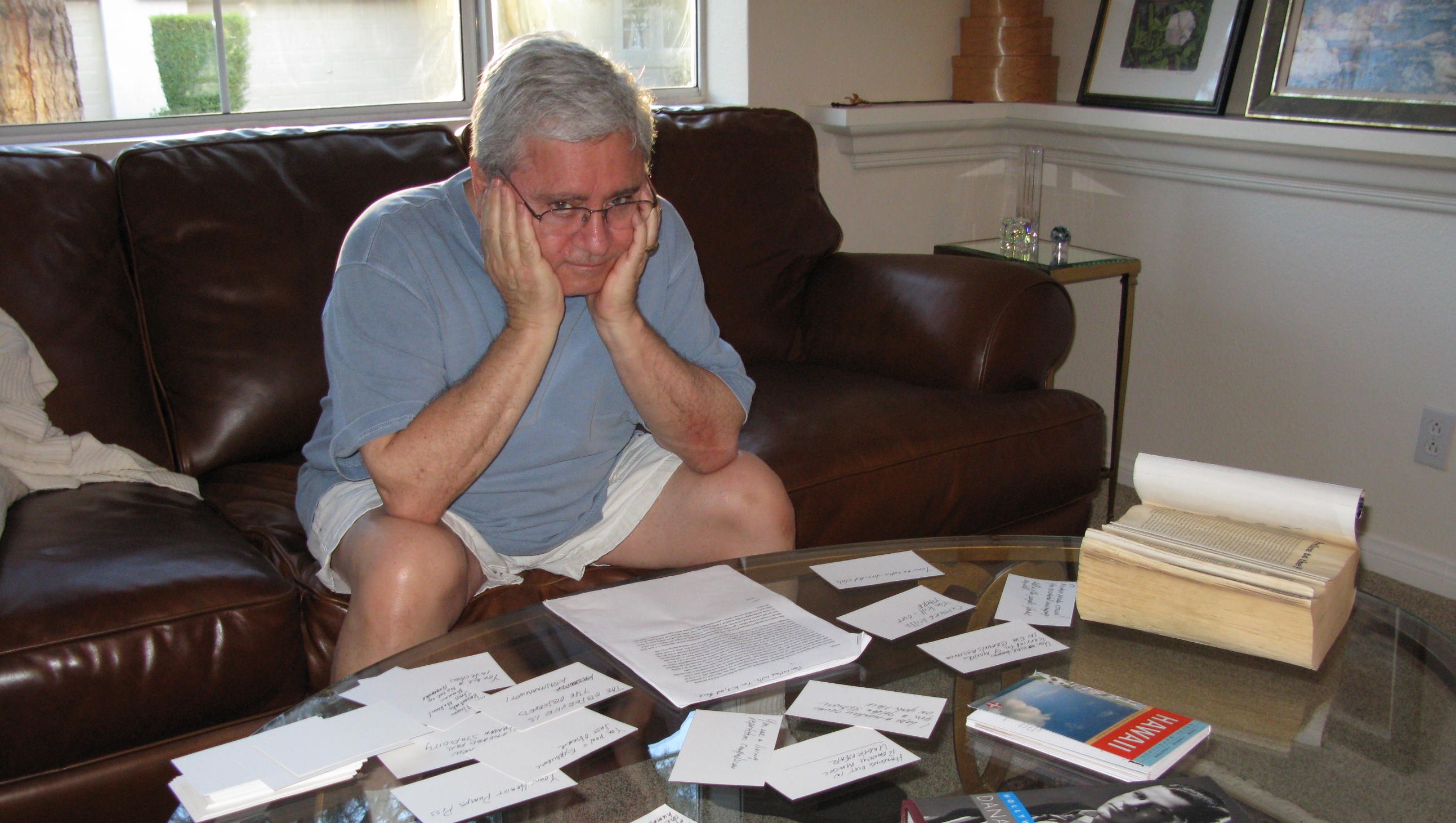
Some time back I had suggested to my son, Jordan, that he do a videotape interview with me. I had recognized that I was an old man and I wanted to leave a remembrance of myself with my son by engaging in a father/son dialogue. After all, what is life but distilled memories, a lozenge on the mind’s tongue to savor in reverie? I knew that it would be a record of a kind of our shared lineage, ancestry, background, of my parenting and rearing, of his perceptions of me as I morphed and evolved through different stages of my own maturation as a man and father and how all that affected him. The nagging infirmity of all that is that children only grasp one image of the parent forever and often are stuck in that, a kind of template they hold securely to like pacifiers until maturity when life gives them other options and perceptions.
It would be the whole ball of wax, fathers and sons, how he saw me interact with his mother and how that might have affected his own perception of how to relate to women, and so on. It would cover “everything,” but it did not come to pass. (We may yet do that). At conscious levels of awareness I wanted to have him ask me all kinds of nitty gritty questions and I was interested in how well I could talk straight with him. I wanted to share and express to him where I had gone wrong and what I had omitted as a father in dealing with him which still nags me to this day. I was not adverse, at all, to hearing good news. Doubtless, regrets would be expressed. I wanted to dwell in nether land with him. I left it at that, expressed at least.
In the interim I had written and published two essays about him in my latest book, trying to assess him as well as myself, critically, realistically, one essay as a child of five and one as a man in his thirties. I was and I am trying to prepare as I have done all my life for my departure from this flash of existence given me, quite randomly I must say. Here live, life commanded, without a manual in the glove box to reach for. Kazantzakis writes in Report to Greco, “Our lifetime is a brief flash, but sufficient.”
And so early in the year, it need not matter when, Jordan told me he was working on a screenplay called “Non-fiction,” that he felt would be a good way to have us interact as father and son; that he would fly into Las Vegas with his friend, Brendan Jamieson, a cinematographer and that over a period of two days we would direct the screenplay. In fact, he paid for his friend’s airfare and rented a teleprompter, at quite a financial cost. He sent me the screenplay and I read it very carefully, highlighting sentences, commenting in the margins, initially finding it too verbose or knotted. I began to coalesce several concerns about its efficacy. I was unsure of my own ability to act this out. Jordan over the phone and in an e-mail tried to assuage my concerns, my anxieties that I would not get through it, that I need not memorize everything and here I need to cite his cover letter that arrived with the screenplay:
…We, of course, will have you ad lib a lot as well and integrate it into the film in different ways, not just linearly. I’m sending you the script so that you have time to get really comfortable with it before the shoot. Don’t worry about memorizing too much. I can hook up a laptop to a monitor and “teleprompt” with teleprompting software. In that way you will be basically reading the script, but with emotion and at your own pace. Of course we will break it up into manageable chunks so it’s not overwhelming. Brendan will be shooting and tech support for the piece and he is a pro at my studio so you will be in good hands. Don’t be surprised if the shoot lasts many hours or half the day on Saturday (that would be on October 20). It always takes longer than you think, between setting up the cameras and equipment for each framing of a shot, to getting the read right to x factors like horns honking outside at the wrong time. But most important of all, I wrote this for us to have fun with it. And after what you just went through (a medical condition throughout the summer of 2012) I hope that in more than one way it may be therapeutic for you. Filming is for me.”
I was to play an “old ornery prick.” Clearly cast perfectly for this role, I was to “feel” free to ad-lib personal insults anywhere I felt it warranted. In essence, I realized the screenplay seemed a riff on Pirandello’s “Six Characters in Search of an Author,” which I had enjoyed reading in college decades ago. Jordan did not know of this play, but it was my association to what he had written. I read the screenplay through several times and not with pleasure. I was growing increasingly anxious about memorizing the lines but a phone call between us resolved that as he told me it would be fun, don’t worry, don’t fret, calm down, he’ll take charge of it all. (Son allays father’s anxieties.) And if it collapsed into nothingness at least we had a good time setting fire to all our efforts. At that time I had no idea of what that really meant until the day of the shoot, which was about a month off.
After several readings I sent off an email to Jordan telling him that I had an “epiphany,” I had grasped what he was after, that I had my hand on the pulse of the screenplay and now I could manage the performance. Jordan, like me, is not too much a fan of our society, of western medicine and of politics and politicians in general. He does not suffer fools. The manifest level of the play is an old curmudgeon directly speaking to a “person” behind the camera, everyman, or every conditioned dolt. He is the prick’s target.
The monologue is scornful, derisive, sarcastically snide, arrogant as the old ornery prick excoriates the subject behind the camera, debriding him like dead skin. The curmudgeon puts him down emotionally, psychologically and intellectually for he represents the common man of our time, the one whose wife wants a stainless steel kitchen, an open floor plan and granite countertops because it matches her “lifestyle.” The common man is a male version of Teresa Giudice of “The Real Housewives of New Jersey” — empty, thoughtless, primal, and dumb, IQ 89, a Dr. Moreau hybridization of Trump and Palin.
The screenplay is called “Non-Fiction,” and here we move to the latent level of the play, its subtext. Jordan is attempting to contrast fiction with non-fiction in life, reality and illusion, as if he is using the play to examine the common man as a demented and twisted Don Quixote in jeans. He accomplishes this in several places and in several ways and the artifice of it all is that one or more lies are told about the Lumiere brothers, very early filmmakers. I present it as a true anecdote and much later I go about destroying the anecdote as just an urban legend, leaving the observer, our jean hero, confused, battered and dumped on. Movies are a perfect example of illusion portraying itself as reality. On the other hand, the movie is an artifact of reality. Consider the confusion.
As an example I offered my ad-lib input which may end up on the cutting floor or not, although a cutting floor is much the misnomer nowadays. In 1924 Robert Flaherty filmed a famous documentary about an Inuit called “Nanook of the North.” It is now considered an early classic for its realism and all the adjectives associated with filming “natives” anthropologically. However, one scene is staged! Nanook comes across a phonograph and is stunned to hear the music coming from the steel record used in those times. So what is real, what is not real? Welles’ did this ingeniously in his documentary called “F is for Fake.”
Indeed, I ad-libbed about Kafka’s “Metamorphosis,” because it begins with a lie, either we believe or we do not believe that Gregor Samas has morphed into a cockroach. Or, fiction is a lie well told. (I think of the master, Poe.) But what is non-fiction and how do you determine this? The screenplay had these tones to it, but it was to be played by me, as directed by my son, as a kind of scathing frolic and so it was.
I cannot recreate the two days before the camera, he pompously says, because I believe it is beyond my ken; however, what I can do is give snippets and my associations as well as feelings about what was happening. Essentially I was given the Alfred Hitchcock pose, speaking to the camera straight on in that old series of his in the 60s. I was placed at the head of our dining room table and it was propped with books, a magnifying glass, and a small Inuit statuette of a man, giving a rough and whiskered sense of atmospheric intellect, a few books piled up next to me to substantiate my presence.
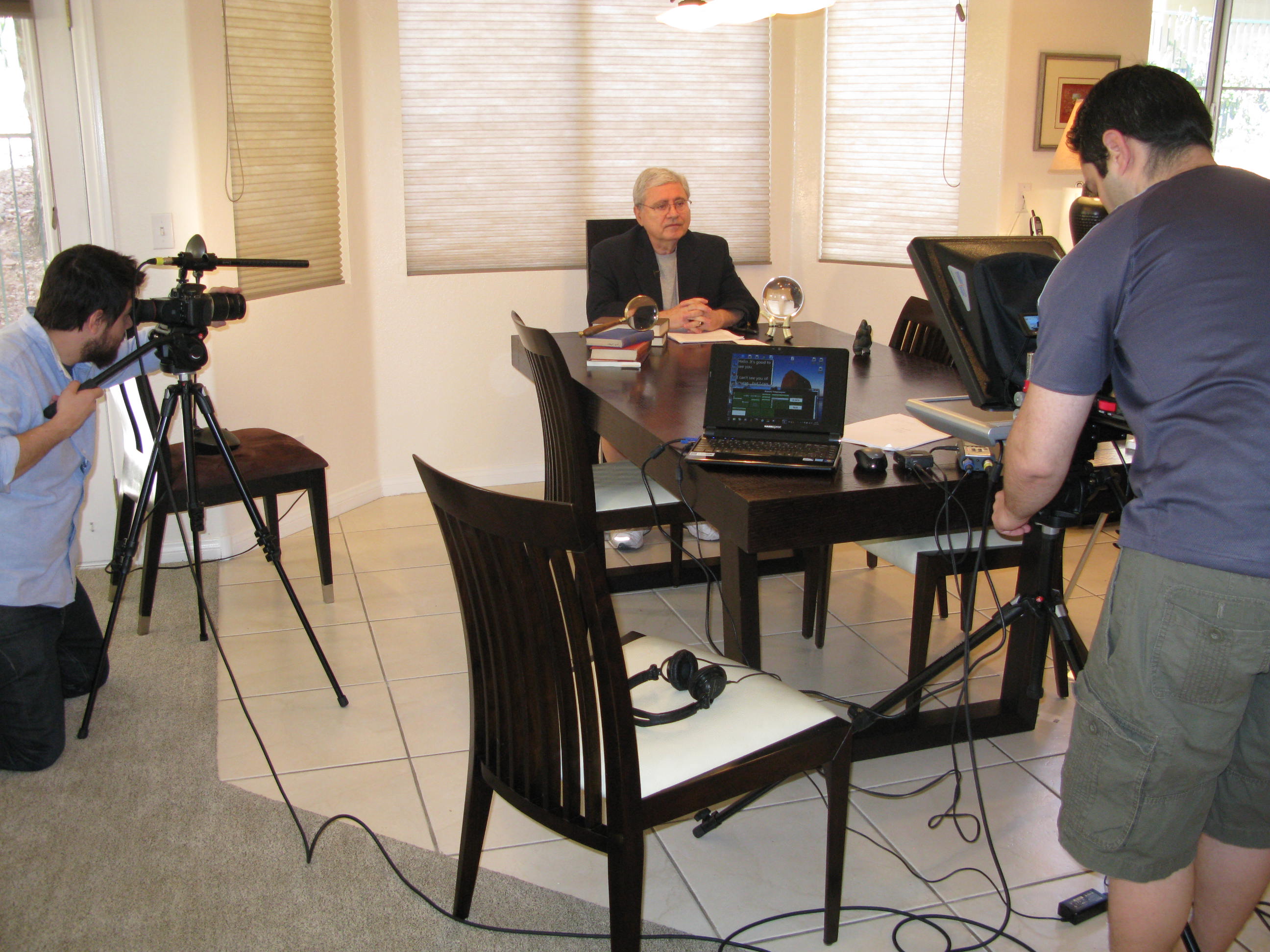
At the other end of the dining table two cameras were set up as well as a third for angle shots. I was asked to speak to the camera directly in front of me which had a teleprompter next to it with the screenplay’s dialogue in large letters, easy for me to read, almost as if I was in an optometrist’s office calling out letters from five or six feet away. Jordan could control the pace of the scrolling which made it very easy for me to read. It came to pass, as he said, that what I needed to do was not memorize but simply perform as the words came up and I took to that easily.
I had spent decades as a teacher of English so I had a general sense of what to emphasize in a line of poetry or in prose, although I knew I was no actor but only a ham, for teachers are essentially standup comics in any case. What comforted me no end is that Jordan gave me line readings which I really took to. He would say read it this way, or try to stress this word, and then he read the line with the inflection he wanted. Parenthetically, I felt proud that as the writer he knew what he wanted as the director. In this way I felt assured and I could easily mimic what he wanted for I am much the ham and ebullient self — I love to perform. My life is a performance, so is yours if you get into it — think Zorba the Greek!
My wife, Jane, had been asked by me to photograph as much as she could behind the scenes because I wanted a record of Jordan and Brendan, staging the “set,” setting up cameras for special shots, and Jordan directing his father as a remembrance of this event, for I am much into remembering. For me memory is a kind of everpresent resurrection of the past, the only authentic thing we have after the event itself. In this way I sustain the memory of all the losses I have had in my life. And, in effect, as I will discuss later, Jordan was fully aware of the subterranean meaning of this entire event, for as an artist, and he is the artist, he was churning out a mutual lifelong relationship into some kind of art, making it more telling and compelling than just a taped interview with his father, something that we could do down the line in any case.
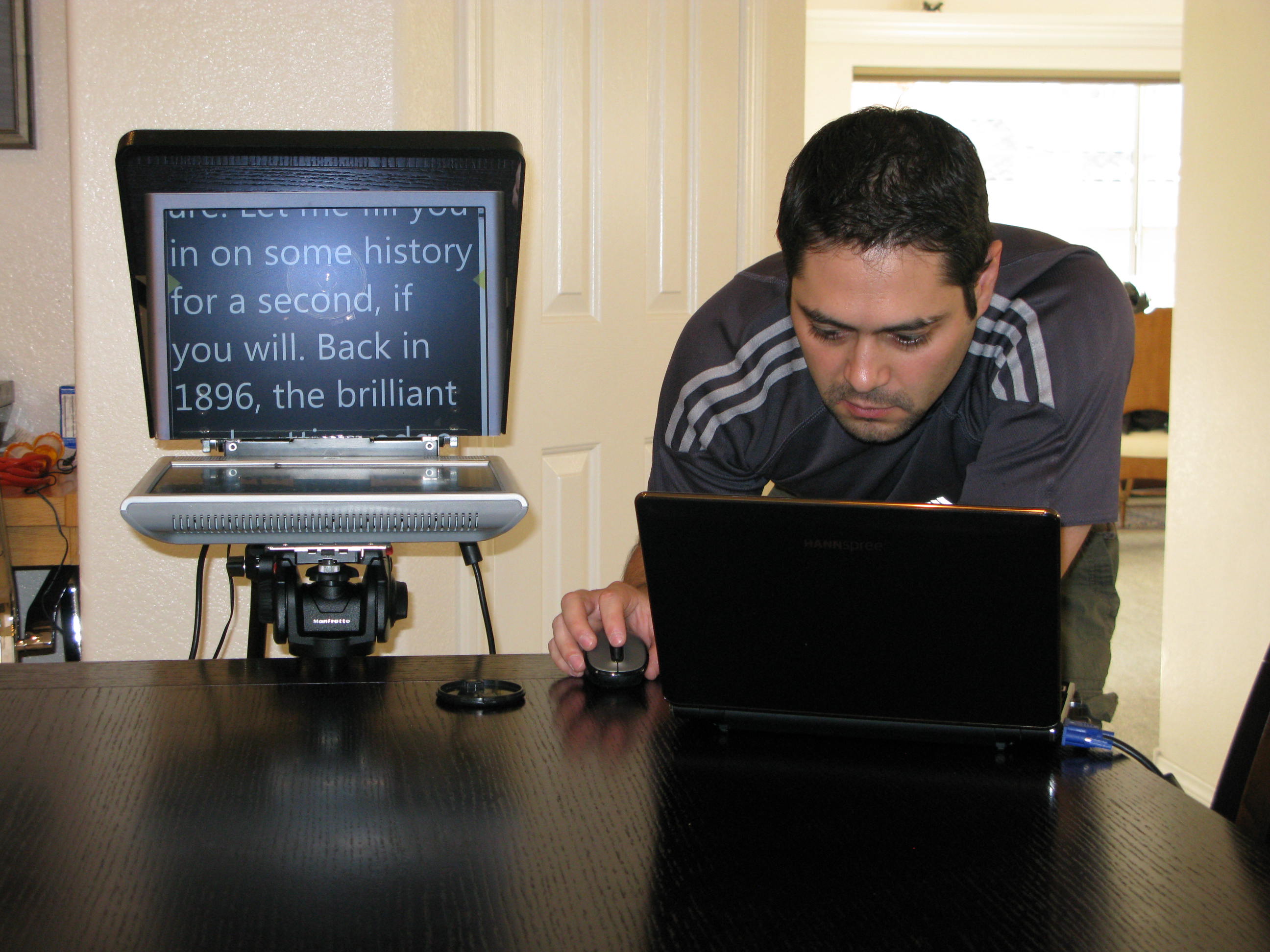
The shooting began well. After one reading by me, Jordan said, “Awesome.” Well, that was very reassuring to me, for he doesn’t say “awesome” frequently. To put it another way, dad had nailed it. In short a kind of subterranean river of mutual respect was forming. I was nailing it and he was not totally surprised that I was capable of doing that. We don’t underestimate one another. Brendan shared that many people freeze up before a teleprompter, something I did not know or should know. Brendan and Jordan, I suppose, first thought that it would be a hurdle and when it proved not to be a hurdle the shoot went on with speed, to everyone’s delight. “Awesome” was said several more times during the Saturday shoot. Coming from my son, that was very sweet. “Now, Dona Lisa, move you head a little to the right side.” “Of course, Signor DaVinci.”
After a shot or sequence of lines sometimes I would not get confirmation, but Brendan, off to the side and where Jordan could not see, put both thumbs up. He was affirming his own “awesome.” I later asked him why he signaled instead of saying something and he responded that he did not want to disturb the director but he needed to tell me that I was performing up to snuff. So I looked for his Ebert thumbs up as well as to “awesome.” We all need to be stroked.
As required by the script I had to “moon” everyman, the conditioned slob, the outer-directed mental muffin this entire screed was addressed to. I did not equivocate. I had heard but I had chosen not to hear or obey that it was optional. I wanted to “moon,” which proved to be hilarious to all. I was into performing. Four times I responded to the director’s instruction because he couldn’t just get the right shot. My ass was akilter or out of the frame here and there. I recall how I waited for him to say cut so I could pull my pants up. Earlier in the shoot he had told me to wait at least three seconds after I finished a line or a bit of dialogue while looking directly at the camera. Here I thought three seconds had passed with my exposed ass completely out there. In any case by the fourth shot we were all hysterical about my compulsive need to get the ass shot just right for my son. I had no shame. They thought I would have shame. And so my son was instructed in the ways of the father. We had to stop shooting for we were all wildly laughing from what happened. It would prove to be memorable.
The second eventful sequence occurred while Jane went off on an errand. (I hope that an outtake might be saved just for her viewing.) And here is what happened. I needed to vent a scream, a real scream, a harrowing scream, a Wolfman shriek. Brendan and Jordan mounted the camera on a tripod on the table itself up close and personal, about a foot away from my face. I imagine if I kept my mouth open for a few seconds the camera would capture my uvula moving like a tuning fork. Action was called and I let go with a scream that I again doubled up on midway so as if I completely spit out a dybbuk from my body –perhaps it was all the pent up anxiety of the day. I surprised myself, for it was a very piercing and evocative scream, much to the director’s pleasure. What else am I capable of, I thought. In my son’s safe directorial hands, I had no fear. I trusted him, and apparently he trusted me, father as actor. With that done we resumed the rest of the shoot and day one came to a close.

Jordan and Brendan were very pleased that we had so much footage in the can, so to speak, for everything was done digitally on memory cards. And so on Sunday we got up early and took a small trek out to Red Rock Canyon, a national conservation area which is set in a canyon of magnificent strata with red striations boldly set into the hills. We took the scenic route which was about 13 miles, here and there, stations set aside for parking. Jordan had visited here with his girlfriend, Liz, a year ago, obviously it left an impact, for it was now a setting in his screenplay. The vistas within the park were breathtaking. The canyon was pristine and one sensed Native Americans had lived here in the past, too wonderful to overlook. We spotted a gravel road littered with rocks, stones, and scree. While moving slowly up the road I spotted an indentation by the side and Jordan felt here was a good place to set up the cameras and finish the rest of the script. Across the way from this area was a hill that served as the backdrop and it was dramatic in its color and size.
Red Rock was to serve as the non-fiction part of the screenplay, for here the 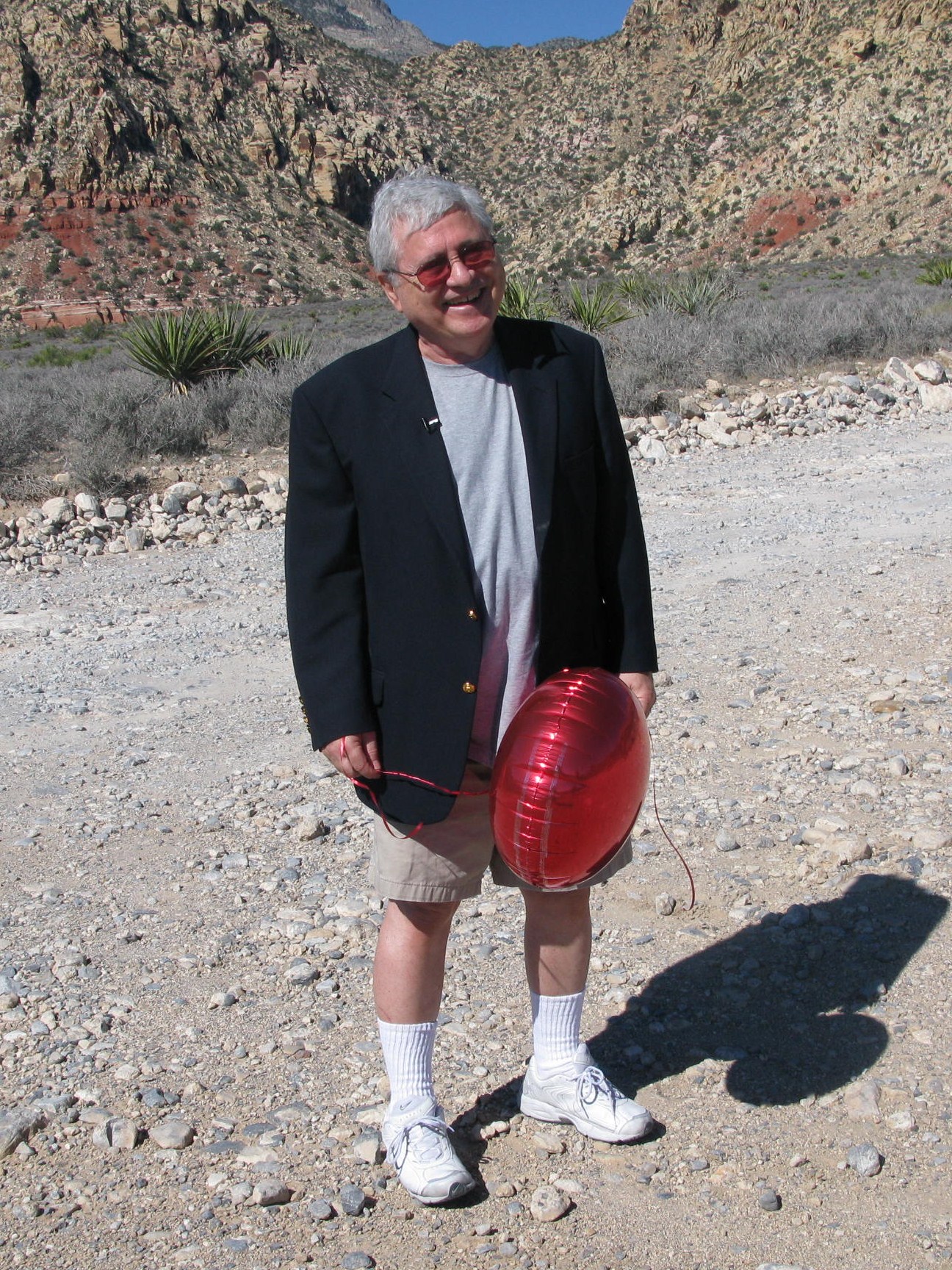 everyman was to be confronted with what was real, tactile and was not a green screen for some kind of projection. The dialogue I had to say went after that in short bursts of acute lines. I had trouble with that for I had not memorized it well. Jordan took me under his control, he read a line and then I repeated it to his satisfaction. With that going well I heard once again “awesome,” and was emboldened for the final piece de resistance.
everyman was to be confronted with what was real, tactile and was not a green screen for some kind of projection. The dialogue I had to say went after that in short bursts of acute lines. I had trouble with that for I had not memorized it well. Jordan took me under his control, he read a line and then I repeated it to his satisfaction. With that going well I heard once again “awesome,” and was emboldened for the final piece de resistance.
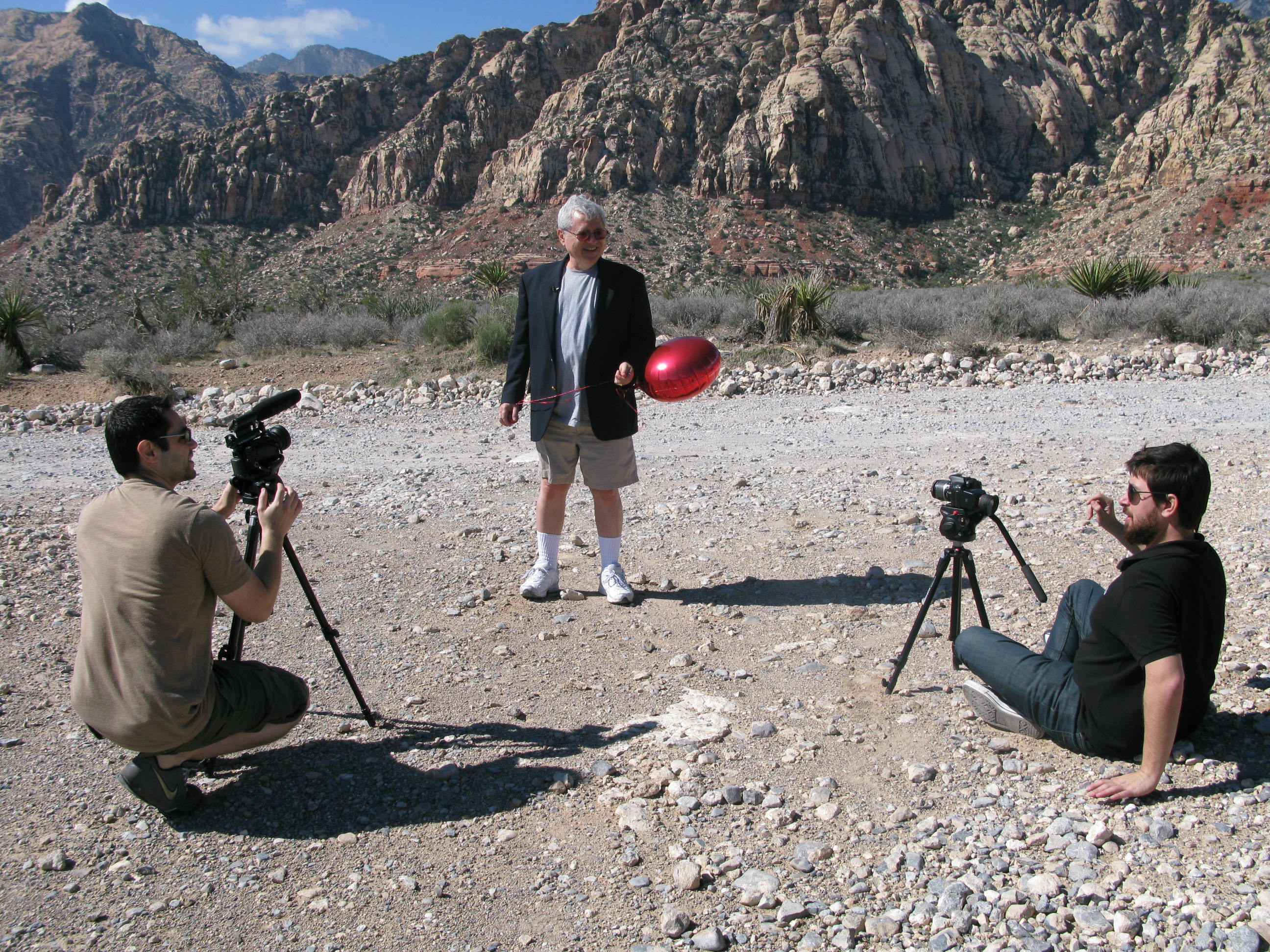 The final scene requires me to do a kind of dance, perhaps one not so much of joy as one of an abrasive sneer to everyman, a finger gouging his eye. I was wearing my blue blazer over a gray t shirt with white shorts and tennis shoes. I assume they were filming above my waist which they had done at the dining table on Saturday. Today it was a full shot. I had a red balloon attached to my wrist, for some symbolic note, I imagine. In any case I referenced in mind an early film of the 30s with Irene Dunne, who could do it all, in “Showboat.” In one scene which I remembered she did a shuffle to music which was evocative and sinuous and so very charming that it took up a few pixels in my memory. I emulated her. Going into the shuffle, to the left, to the right, pushing my pelvis out and then back again, opening my blazer to the left and to right as if exposing breasts, and then punching the balloon as if smacking viciously everyman’s face because he could not grasp anything we did in this script. “Awesome” pealed out and the shoot was over. Jane saw the dance in slo-mo on a laptop later on and in essence just said, “Just you wait, Enry Iggins, just you wait.”
The final scene requires me to do a kind of dance, perhaps one not so much of joy as one of an abrasive sneer to everyman, a finger gouging his eye. I was wearing my blue blazer over a gray t shirt with white shorts and tennis shoes. I assume they were filming above my waist which they had done at the dining table on Saturday. Today it was a full shot. I had a red balloon attached to my wrist, for some symbolic note, I imagine. In any case I referenced in mind an early film of the 30s with Irene Dunne, who could do it all, in “Showboat.” In one scene which I remembered she did a shuffle to music which was evocative and sinuous and so very charming that it took up a few pixels in my memory. I emulated her. Going into the shuffle, to the left, to the right, pushing my pelvis out and then back again, opening my blazer to the left and to right as if exposing breasts, and then punching the balloon as if smacking viciously everyman’s face because he could not grasp anything we did in this script. “Awesome” pealed out and the shoot was over. Jane saw the dance in slo-mo on a laptop later on and in essence just said, “Just you wait, Enry Iggins, just you wait.”
When we came to say goodbye at the airport, I said to Jordan that he was a very good director. In his response and in his voice I knew that meant something to him. (Jane will be a guest blogger here and will give her take on what occurred between all of us and between father and son in late October 2012.) But here are a few thoughts of my own. Unfortunately in the swish of events, I recall saying something very quickly to Jordan to the effect that this was turning out to be something special between all of us and particularly between us. I seem to recall that he said something to the effect that it had been part of his plan to begin with but this does not do justice to what I felt in a bodily way what he communicated to me in that quick moment.
As for me, over two days I realized how serious a commitment I gave to this screenplay, to do well, my own sense of responsibility, something crucial to my own character. I realized almost subliminally that I did not need control here; rather it was to surrender control to the safe and secure directorial hands of my son. I had no problem here. He need not rise up and slay the father. I saw the emotional ham in myself, who as a young man wanted to be an actor but allowed my own self-impediments impede me as well as those of my society that said no; you wouldn’t be good at that. The movie can be cut dozens of ways, but the final product will only be one version of what we all shared over that weekend. It doesn’t matter, for it is in the can, something to reminisce about in the future when I have gone off with Billy Bitzer, Welles and Gregg Toland to the cinematic heaven in the sky. “Ready when you are, Mr. DeMille.”
Leave a Reply